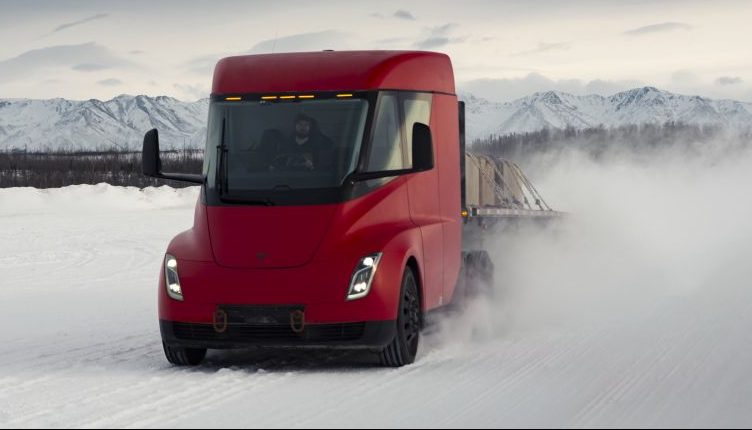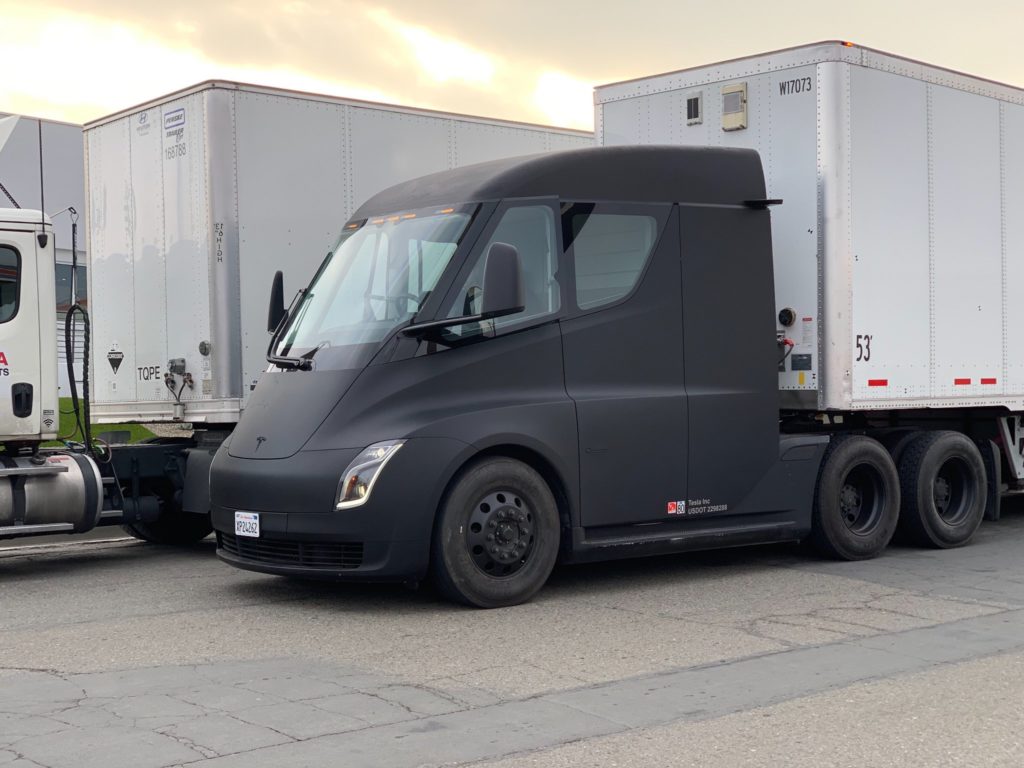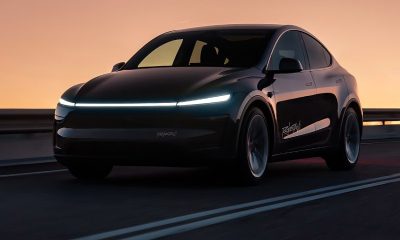

News
The Tesla Semi’s butterfly effect will change the face of heavy-duty freight routes
In a recent interview, Auke Hoekstra, a researcher at Eindhoven University of Technology and an electric vehicle expert, explained how battery-electric trucks like the Tesla Semi could end up dominating heavy-duty freight routes in regions like Europe. According to the EV expert, weight and range limitations that are usually associated with electric vehicles may very well be quite irrelevant when it comes to the real-world use of the electric long-haulers.
While addressing questions from Clean Energy Wire, Hoekstra explained that skeptics of vehicles like the Tesla Semi often take the hardest business case that a diesel truck is able to manage. An example of this is a multi-day trip with a team of two drivers who cover thousands of kilometers in one trip. The EV expert explained that while traditional diesels still hold an advantage against their battery-electric competition in this scenario, this edge disappears when one looks at the greater trucking market.
“My research in the Netherlands has revealed that 80% of trucks – even the really big rigs, the semis – travel 750 kilometers per day at the very most, and many cover far shorter distances. That’s because if you want to cover more kilometers, things become very expensive very quickly, because you have to pay overtime, etcetera. So, in general, you can’t make a driver do more than 750 kilometers per day. Therefore, this is the range you have to hit with about 80 percent of trucks.

“Additionally, almost all trucks return to base at the end of the day – which creates ideal conditions for charging. We still have this romantic idea that truckers are on the road for weeks on end, away from home. But this scenario has become relatively rare. Most truckers simply move stuff from Rotterdam port to Venlo, halfway to Germany’s Ruhr area, to take an example from home… Many truckers do this sort of trip a couple of times per day, and then return home. So, you can charge the vehicle overnight at a default location. This means you don’t have a chicken and egg problem – you can arrange for the infrastructure and for the truck at the same time,” the EV expert remarked.
Interestingly enough, Elon Musk has recently remarked that Tesla is looking to release the Semi with a range that falls well within Hoekstra’s numbers. While speaking at the European Battery Conference, Musk stated that he believes it is feasible to achieve 800 kilometers of range for the Semi quite easily, and he also sees a path, over time at least, for the Class 8 truck to achieve an even more impressive 1,000 kilometers per charge. Such numbers can go a long way towards shifting the market’s perception of all-electric long-haulers and their limitations. Hoekstra, for his part, noted that such a scenario has already happened before with the original Tesla Roadster.

“I do remember that in the car market, things really changed when the Roadster hit the market. That really changed the conversation. It changed the whole perception of electric vehicles. The conventional wisdom back then was that you can only use them on short distances in the city. And suddenly this car appeared, and everything was possible.
“Within the next couple of years, we’ll see the first Tesla semi-trucks on the road. This will have a similarly huge impact on the conversation about electric trucks. You can just point to it and say: “Look, it’s moving there, and it is doing 800 kilometers.” Suddenly, all those people who say ‘it cannot be done’ within truck companies will hear their boss replying: ‘Well, our competitor can do it – so you will have to do it, too.’” Hoekstra said.
What’s quite remarkable is that this is not even the most exciting part of the Semi’s butterfly effect on the trucking sector. If the Tesla Semi finds solid footing in the trucking market in the same way the Model 3 found a good niche among premium midsize sedan buyers, a “Tesla Effect” of sorts could happen on the trucking market. This could come in the form of other battery-electric trucks being developed for the long-haul market. This should, in turn, result in a massive innovation push from several truck makers, similar to what is happening now with companies like Tesla, Lucid, Rivian, and veterans like Ford and GM in the consumer EV segment.
News
Tesla UK sales see 14% year-over-year rebound in June: SMMT data
The SMMT stated that Tesla sales grew 14% year-over-year to 7,719 units in June 2025.

Tesla’s sales in the United Kingdom rose in June, climbing 14% year-over-year to 7,719 units, as per data from the Society of Motor Manufacturers and Traders (SMMT). The spike in the company’s sales coincided with the first deliveries of the updated Model Y last month.
Model Y deliveries support Tesla’s UK recovery
Tesla’s June performance marked one of its strongest months in the UK so far this year, with new Model Y deliveries contributing significantly to the company’s momentum.
While the SMMT listed Tesla with 7,719 deliveries in June, independent data from New AutoMotive suggested that the electric vehicle maker registered 7,891 units during the month instead. However, year-to-date figures for Tesla remain 2% down compared to 2024, as per a report from Reuters.
While Tesla made a strong showing in June, rivals are also growing. Chinese automaker BYD saw UK sales rise nearly fourfold to 2,498 units, while Ford posted the highest EV growth among major automakers, with a more than fourfold increase in the first half of 2025.
Overall, the UK’s battery electric vehicle (BEV) demand surged 39% to to 47,354 units last month, helping push total new car sales in the UK to 191,316 units, up 6.7% from the same period in 2024.
EV adoption accelerates, but concerns linger
June marked the best month for UK car sales since 2019, though the SMMT cautioned that growth in the electric vehicle sector remains heavily dependent on discounting and support programs. Still, one in four new vehicle buyers in June chose a battery electric vehicle.
SMMT Chief Executive Mike Hawes noted that despite strong BEV demand, sales levels are still below regulatory targets. “Further growth in sales, and the sector will rely on increased and improved charging facilities to boost mainstream electric vehicle adoption,” Hawes stated.
Also taking effect this week was a new US-UK trade deal, which lowers tariffs on UK car exports to the United States from 27.5% to 10%. The agreement could benefit UK-based EV producers aiming to expand across the country.
News
Tesla Model 3 ranks as the safest new car in Europe for 2025, per Euro NCAP tests
Despite being on the market longer than many of its rivals, the Tesla Model 3 continues to set the bar for vehicle safety.

The Tesla Model 3 has been named the safest new car on sale in 2025, according to the latest results from the Euro NCAP. Among 20 newly tested vehicles, the Model 3 emerged at the top of the list, scoring an impressive 359 out of 400 possible points across all major safety categories.
Tesla Model 3’s safety systems
Despite being on the market longer than many of its rivals, the Tesla Model 3 continues to set the bar for vehicle safety. Under Euro NCAP’s stricter 2025 testing protocols, the electric sedan earned 90% for adult occupant protection, 93% for child occupant protection, 89% for pedestrian protection, and 87% for its Safety Assist systems.
The updated Model 3 received particular praise for its advanced driver assistance features, including Tesla’s autonomous emergency braking (AEB) system, which performed well across various test scenarios. Its Intelligent Speed Assistance and child presence detection system were cited as noteworthy features as well, as per a WhatCar report.
Other notable safety features include the Model 3’s pedestrian-friendly pop-up hood and robust crash protection for both front and side collisions. Euro NCAP also highlighted the Model 3’s ability to detect vulnerable road users during complex maneuvers, such as turning across oncoming traffic.
Euro NCAP’s Autopilot caution
While the Model 3’s safety scores were impressive across the board, Euro NCAP did raise concerns about driver expectations of Tesla’s Autopilot system. The organization warned that some owners may overestimate the system’s capabilities, potentially leading to misuse or inattention behind the wheel. Even so, the Model 3 remained the highest-scoring vehicle tested under Euro NCAP’s updated criteria this year.
The Euro NCAP’s concerns are also quite interesting because Tesla’s Full Self-Driving (FSD) Supervised, which is arguably the company’s most robust safety suite, is not allowed for public rollout in Europe yet. FSD Supervised would allow the Model 3 to navigate inner city streets with only minimal human supervision.
Other top scorers included the Volkswagen ID.7, Polestar 3, and Geely EX5, but none matched the Model 3’s total score or consistency across categories. A total of 14 out of 20 newly tested cars earned five stars, while several models, including the Kia EV3, MG ZS, and Renault 5, fell short of the top rating.
Elon Musk
Why Tesla’s Q3 could be one of its biggest quarters in history
Tesla could stand to benefit from the removal of the $7,500 EV tax credit at the end of Q3.

Tesla has gotten off to a slow start in 2025, as the first half of the year has not been one to remember from a delivery perspective.
However, Q3 could end up being one of the best the company has had in history, with the United States potentially being a major contributor to what might reverse a slow start to the year.
Earlier today, the United States’ House of Representatives officially passed President Trump’s “Big Beautiful Bill,” after it made its way through the Senate earlier this week. The bill will head to President Trump, as he looks to sign it before his July 4 deadline.
The Bill will effectively bring closure to the $7,500 EV tax credit, which will end on September 30, 2025. This means, over the next three months in the United States, those who are looking to buy an EV will have their last chance to take advantage of the credit. EVs will then be, for most people, $7,500 more expensive, in essence.
The tax credit is available to any single filer who makes under $150,000 per year, $225,000 a year to a head of household, and $300,000 to couples filing jointly.
Ending the tax credit was expected with the Trump administration, as his policies have leaned significantly toward reliance on fossil fuels, ending what he calls an “EV mandate.” He has used this phrase several times in disagreements with Tesla CEO Elon Musk.
Nevertheless, those who have been on the fence about buying a Tesla, or any EV, for that matter, will have some decisions to make in the next three months. While all companies will stand to benefit from this time crunch, Tesla could be the true winner because of its sheer volume.
If things are done correctly, meaning if Tesla can also offer incentives like 0% APR, special pricing on leasing or financing, or other advantages (like free Red, White, and Blue for a short period of time in celebration of Independence Day), it could see some real volume in sales this quarter.
You can now buy a Tesla in Red, White, and Blue for free until July 14 https://t.co/iAwhaRFOH0
— TESLARATI (@Teslarati) July 3, 2025
Tesla is just a shade under 721,000 deliveries for the year, so it’s on pace for roughly 1.4 million for 2025. This would be a decrease from the 1.8 million cars it delivered in each of the last two years. Traditionally, the second half of the year has produced Tesla’s strongest quarters. Its top three quarters in terms of deliveries are Q4 2024 with 495,570 vehicles, Q4 2023 with 484,507 vehicles, and Q3 2024 with 462,890 vehicles.
-

 Elon Musk5 days ago
Elon Musk5 days agoTesla investors will be shocked by Jim Cramer’s latest assessment
-

 News1 week ago
News1 week agoTesla Robotaxi’s biggest challenge seems to be this one thing
-

 Elon Musk2 weeks ago
Elon Musk2 weeks agoFirst Look at Tesla’s Robotaxi App: features, design, and more
-

 News2 weeks ago
News2 weeks agoWatch Tesla’s first driverless public Robotaxi rides in Texas
-

 News2 weeks ago
News2 weeks agoWatch the first true Tesla Robotaxi intervention by safety monitor
-

 Elon Musk2 weeks ago
Elon Musk2 weeks agoTesla to launch in India in July with vehicles already arriving: report
-

 Elon Musk2 weeks ago
Elon Musk2 weeks agoTesla officially launches Robotaxi service with no driver
-

 Elon Musk1 week ago
Elon Musk1 week agoA Tesla just delivered itself to a customer autonomously, Elon Musk confirms

















